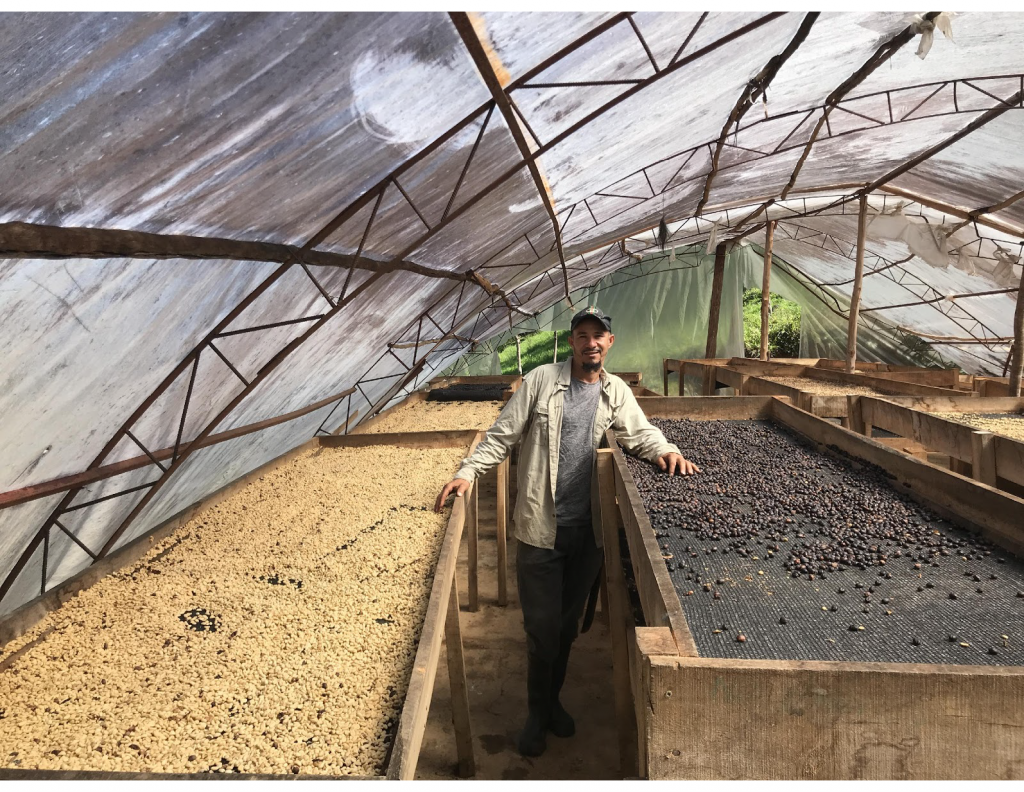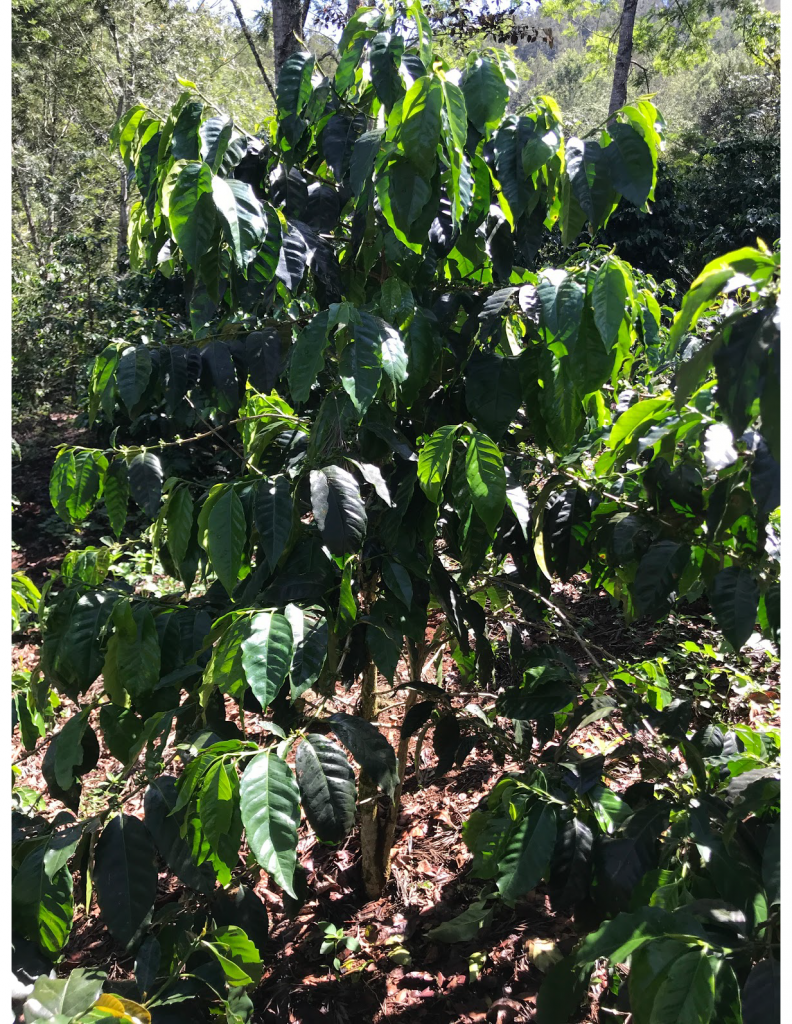As I prepared to check my patient’s eyes with my ophthalmoscope, I couldn’t help but notice the worn pair of scratched eyeglasses clutched in her calloused hands. Working in the fields surrounding her batey—or sugarcane village—in the south Dominican Republic had clearly taken its toll on her hands, her eyes, and her body. I finished my exam, refilled her medications, and gave her a new pair of reading glasses; I felt that we had done good for this woman. I concluded with my usual speech and asked if she had any questions as I began to stand up. She grabbed my hand and began telling me about her sister who was recently laid off from the sugarcane mill and who had begun begging for money in order to feed her hungry children.

Delvie, the Spirit Mountain Organic Coffee plantation manager, was kind enough to provide a tour of everything Spirit Mountain has to offer. He comes from humble beginnings in a nearby town in Jarabacoa and began working at Spirit Mountain at a young age. He says he is grateful to work in nature at such a beautiful institution. Photo courtesy of Neeraj Vij.
For many who have had global health trips, experiences like this are common. They are the types of experiences that stay with us when we return home. As part of our medical school curriculum, we are taught to consider all components of health, including social and economic influences. But understanding these cornerstones of health in a foreign nation often proves difficult. We can deliver temporary healthcare to low resource areas through mission trips, but delivering the necessary long-term solutions that fundamentally improve social determinants of health requires creativity. As we pondered the stories of those we met on our global health trip to the Dominican Republic, we began to wonder how we might provide more permanent economic support and quality healthcare to our clinic. Perhaps, something unrelated to healthcare might provide a solution.
Coffee was first introduced to Hispaniola, the island the Dominican Republic shares with Haiti, in 1715 by early French colonists. The rich soils of the mountainous interior of the country were perfect for growing coffee. By 1788, half of the world’s coffee was grown on the island. The economic riches that slave trade-fueled coffee brought the European powers was astounding. When the slave revolt of 1803 gained the island its freedom from the French, Napoleon famously shouted, “Damn coffee! Damn colonies!”
Today, coffee remains an economic keystone in this part of the world, and the Dominican Republic produces between 350,000-500,000 bags of Arabica coffee per year. It also provides support to thousands of rural Dominicans, including Delvie, the plantation manager at Spirit Mountain Coffee farm, which we were lucky enough to visit. The majority of coffee farms in the Dominican Republic are smaller than 3 hectares, and much of the coffee is cultivated organically, meaning that they the farmers are largely small business owners. Spirit Mountain Coffee is just one of hundreds of coffee farms that exist in the Dominican Republic.

Spirit Mountain Organic Coffee — the source of coffee for the Dame Luz Coffee Collaboration. After visiting, it was clear that Spirit Mountain is a special place that cares for its workers and takes pride in its coffee. Photo courtesy of Neeraj Vij.
So, how can a coffee plantation play a role in global health? Coffee beans are a product that the Dominican Republic can grow and export, creating wealth for the nation and jobs for its citizens. Roasters and vendors sell the delicious drink at a profit. In the spirit of companies like Tom’s Shoes, we wondered if it would it be possible to reinvest these profits in the healthcare of the citizens producing this coffee.
This idea sparked the Dame Luz Coffee Collaboration: a global health partnership between Blue House Coffee Goods here in Phoenix and local coffee plantations in the Dominican Republic. The name of this coffee, “Dame Luz,” translates to “give me light” in Spanish; it represents both the warmth of the people of the Dominican Republic and the cause behind these beans. All of the proceeds from the coffee support the Global Health Interest Group’s mission to provide healthcare to rural Dominican Republic on a consistent basis.
Grown in the high-altitude forests of the Cordillera Central mountains, the coffee ripens slowly and offers the farmers and workers in this region a better than fair trade livelihood. During our visit to the coffee farm, we were surprised to see that the coffee was shade-grown under a canopy of banana, macadamia, guava and Hispaniola pine trees. The coffee is well-rounded, with a gentle flavor of citrus followed by a rounded nuttiness.
Dominican coffee will support the Global Health Interest Group and help build up an industry that can cultivate socioeconomic wellbeing for many, including my patient from the batey who needed economic stability and healthcare for her nieces and nephews. For consumers, the coffee will bring joy – not only in its taste but also in the knowledge that it can help generate a future of economic security, health, and wellness to the great people of our partner community.
About the Authors:
Neeraj Vij is a medical student at the University of Arizona College of Medicine – Phoenix in the class of 2022. In his undergraduate years at the University of Arizona, he found a passion for healthcare delivery to international underserved communities through the Arizona Global Health Project. As a medical student, he helps lead the Global Health Interest Group with a focus on finding long-term solutions to healthcare disparities. His other interests include mountain biking, swimming, weight lifting, nutrition, and travel.
Matt Mitchell is a medical student from the University of Arizona College of Medicine – Phoenix, Class of 2021. He claims heritage to both Arizona and Utah and graduated from Brigham Young University in 2017 with a Bachelor of Science degree in neuroscience. He enjoys sports, camping, eating, and, most of all, spending time with his wonderful wife and beautiful daughter.
Sam Beger is a medical student and Master of Public Health student in the Class of 2021 at The University of Arizona College of Medicine – Phoenix. He earned his B.S. in Anthropology and his M.A. in Applied Ethics at Arizona State University where he spent weeks in Cuba shadowing and interviewing physicians. Before attending medical school, Sam worked as an E.D. tech and founded a Phoenix-based coffee roasting company.
Editor’s Note: Editor’s Note: The Differential does not profit from any coffee sales and does not directly endorse this product.
Neeraj Vij is a medical student at the University of Arizona College of Medicine – Phoenix in the class of 2022. In his undergraduate years at the University of Arizona, he found a passion for healthcare delivery to international underserved communities through the Arizona Global Health Project. As a medical student, he helps lead the Global Health Interest Group with a focus on finding long-term solutions to healthcare disparities. His other interests include mountain biking, swimming, weight lifting, nutrition, and travel.
